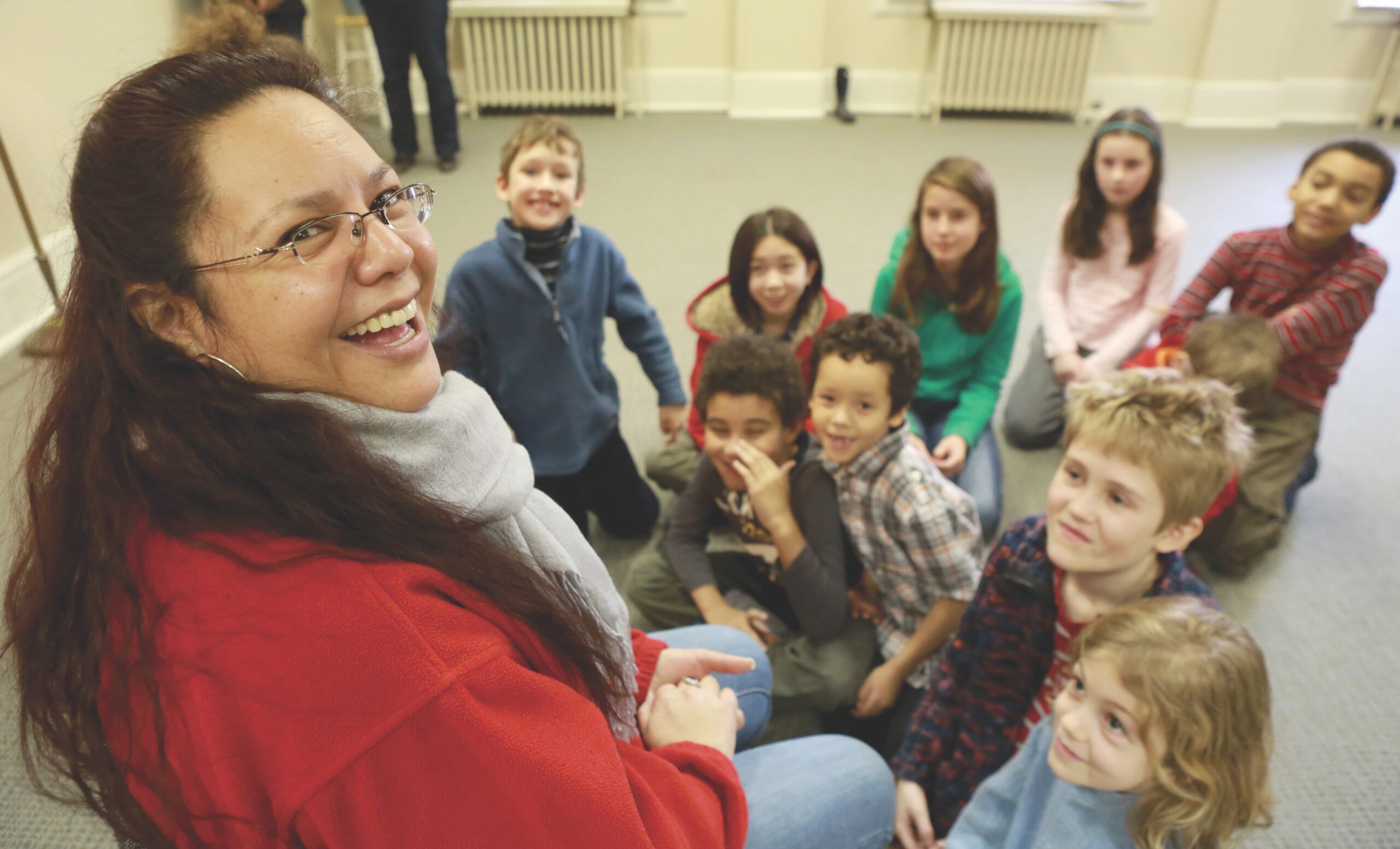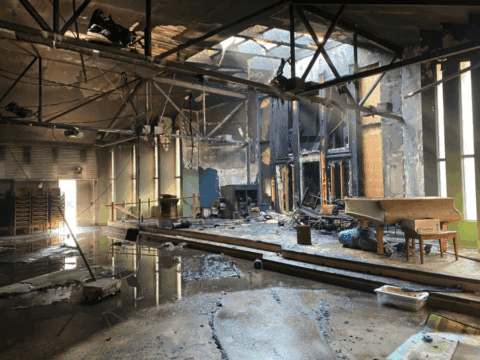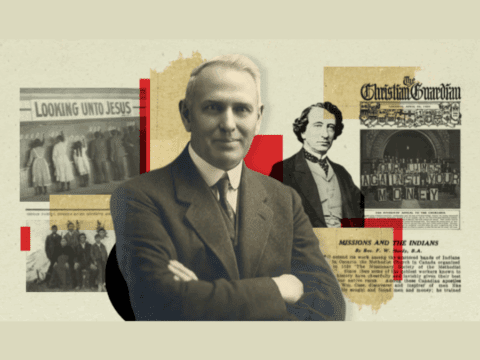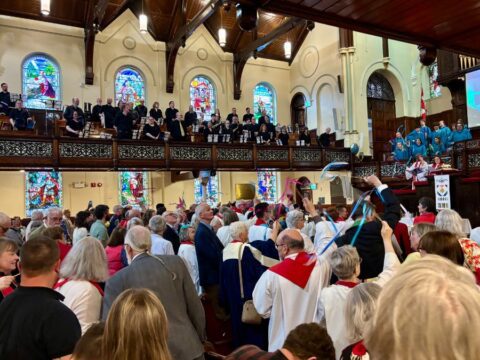It’s Sunday morning at Emmanuel Howard Park United. Sunlight filters through the stained-glass windows and falls on the heads of the congregation — the white ones, the brown ones, the blond ones. And on this particular Sunday, it also shines on the shaved head of the Buddhist monk who is chanting on the dais.
The monk is part of a special Sunday school program. For six weeks, the Toronto church invited representatives from other faiths to come talk about their cultures and beliefs. The kids heard a Muslim woman share a sacred prayer, and they sampled traditional Jewish food. Baha’i and First Nations people also shared their faiths.
Rev. Anne Hines proposed the program because she wanted to give the church youth one message that would make sense as they went through life. “If kids walk out of church at 13 or 14, what do we want them to know?” she asks. The answer: “Whatever brings them into connection with other people, that’s God. Pursue that, honour that, proclaim that. Many stories, rules and ideas in the church don’t hold up in our real world, but this felt entirely useful and true — whatever brings us together is God.”
Many congregations across Canada are reaching out to people of other faiths and experiencing God in the process. Here are a few ideas to consider.
Make Connections
Deciding to do the program was easy, says Hines. Living in a big city, the kids at Emmanuel Howard Park are exposed to other cultures almost daily. But rather than touring the young people through a mosque, synagogue and temple, Hines chose to invite guests of other faiths to the church. “It’s a qualitatively different experience, and a different message about the program, for the kids to be in their own relaxed space, seeing people they know welcoming these guests.”
Finding speakers was trickier than Hines anticipated since she wanted people with the skills to relate their religion to children. Some were also confused by the idea that Hines was inviting them to the church. “The church has been a bit of a fortress, and we continue to be in some ways,” says Hines. “Without exception, every group I contacted was so moved by the idea that a Christian church wanted them to come into our space.”
Choose themes
St. Andrew’s-Wesley United in Vancouver hosts an annual Exploration in World Religions festival. The program runs for six weeks and examines a different theme each year. One year, organizers posed a life question each week and invited faith representatives to answer. Another year highlighted ethical questions. Participants heard the Jewish, Muslim and Christian perspectives on creating a moral economy.
They also got the Humanist, Islamic, Jewish and Christian views on the importance of being free to ask questions.
“It just feels like really important work,” says minister Tim Scorer, who organizes the festival. “[We are] understanding how the Spirit is alive, not only in our own narrative, but in many other traditions.”
Scorer had the fun of matching issues to religions — for the question of what we make of suffering, for example, he knew he needed the Buddhist perspective.
Seek out interfaith groups
Churches can also reach out to multifaith organizations, which exist to provide links between different faith groups and to support interfaith programming. The North American Interfaith Network holds an annual conference that brings together individuals working on interfaith projects in their own communities, as well as interfaith organizations and academic institutions.
At the conference, people share best practices and learn from each other.
“People’s own experience is often a great starting point,” says Gail Allan, the General Council’s program officer for interfaith relations and the vice-chair of the NAIN board. “It’s living with neighbours in a pluralistic world in which we are called upon to love thy neighbour, looking for ways to engage with that reality, to get to know our neighbours and to find ways to work together.”
NAIN has worked with the United Church in studying its relations with the Jewish and Muslim faiths. There is now a study in the works to examine United Church-Hindu relations.
Allan says it is often helpful for different faith groups to work together on issues that aren’t specifically about religious doctrine. This was the case at the G8 and G20 conferences in Canada, when interfaith leaders from around the world joined forces on issues of poverty and climate change.
“I think what happens is we get involved and work together and avoid some of the debate about [religious] issues, and somewhere along the way, one hopes that we build relationships and trust so that we can have these religious conversations.”
Nurture Relationships
Rev. Will Sparks, minister at Northwood United in Surrey, B.C., lives in a community largely made up of South Asians. He enjoys interacting with other cultures and thinks the Gospel calls us to do the same.
“I think the Gospel now leads us to lay down that mission of spreading the Word in favour of an expanded mission of creating a broader ecumenism, experiencing the faith of all our neighbours.”
Sparks sees the damage done by fundamentalists of all religions — the various ways people push away those different from them. “We should be nurturing interfaith relationships, so that we treat each other as human beings and we look with suspicion on anyone who would demonize [others],” he says.
Northwood United is involved in several interfaith initiatives, such as learning about other religions and then going on field trips to their places of worship. Through their relationships with other faith groups, congregation members arranged a multifaith prayer vigil following the 2011 tsunami in Japan and created a multifaith kids camp instead of the traditional vacation Bible school.
Sparks says the idea of sharing faiths can be confusing for people who believe their primary task is to evangelize. But, says Sparks, “part of our discipleship is to know and love our neighbours, including their faith. We should be eager to share our faith, not from a place of wanting to convert people, but from wanting to know our neighbours. And we grow in our own faith at the same time.”
***
This story first appeared in The United Church Observer’s April 2013 issue with the title “Different faiths, common ground.”














